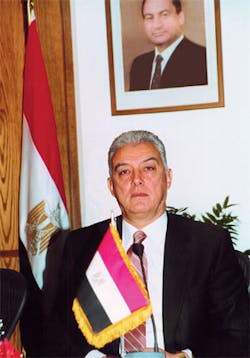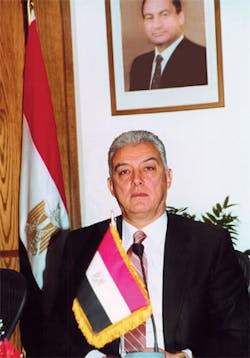Interview with H. E. Mr. Sameh Fahmy Minister of Petroleum of Egypt
Q: Egypt is a significant oil and gas producer in the Middle East and Africa, and is fast exceeding its own expectations for reserves. What can you tell us about the real estimates of reserves?
A: The country’s oil production has tapered off over the past two decades despite the challenges facing crude oil production and also as a result of the natural decline in production from the mature fields discovered in the 60’s and 70’s. The Ministry of Petroleum succeeded in maintaining its production levels with a minimum decline rate over the last five years and we currently sit at a little under 700,000 bpd of oil and condensate production.
Today, proven oil and condensate reserves stand at 3.7 billion barrels. Proven gas reserves reached 67 trillion cubic feet (tcf) at the closing of our last calendar year. There also exist an additional 100-120 tcf of potential reserves (according to the studies of international companies operating in Egypt that is compatible with a recent study done by a major reputable international consultant). This study focused on petroleum potential and the future expectations for international offshore reserves. The study reached the distinctive conclusion that Egypt occupies the 2nd place in the total estimates of gas reserves in deep-water, offshore worldwide.
Q: Demand for petroleum products has been relatively flat since 1999 (largely due to the increased use of natural gas). What are Egypt’s expectations in terms of exploration?
A: Intensive exploration and production activities are on-going, at about over 30% of Egypt’s total area. There are 58 international and private companies currently operating through more than 102 concession agreements including major international companies such as BP, BG, ENI, Shell, Apache and Petronas, amongst others.
During the last two years about 63 agreements and amendments were signed with financial commitments reaching $2,188,130 billion and with the drilling of more than 258 wells. This significant number of agreements reflects the willingness of IOC to invest in Egypt for its significant potential in the oil and gas sector and for the discoveries achieved in the last few years (especially in the Mediterranean, Nile Delta and Western desert). Exploration activities are currently directed for new frontier areas in the Red Sea, Upper Egypt and Western Desert and offshore in the Western portion of the Mediterranean deep-water area.
In addition to the above, a new holding company called “GANOPE” was formed in 2003 following the Ministry of Petroleum’s strategy to enhance exploration activities in the Upper Egypt area and has since succeeded by offering three rounds of bidding. It has also announced the fourth round of bidding and has made great progress in attracting companies to explore within its vast territory. It has awarded seven blocks in the Upper Egypt and the Red Sea area and the first exploratory well will be drilled before the end of this year.
Q: What are the output perspectives in Egypt’s four traditional areas; the Gulf of Suez (about 50%), the Western Desert, the Eastern Desert and the Sinai Peninsula?
A: Of the country’s most known producing regions, the Gulf of Suez, is synonymous with being mainly an oil rich area, and despite the fact that production in the area is on the decline, international and national oil companies have not yet given up hope on making further oil discoveries. For example, in 2003 the largest oil discovery was made to date with proven oil reserves about 80 mmbbls and an expected rate of 45,000 bpd after field development. Additionally in 2004, there was another major discovery in the offshore area by the National Company with proven reserves up to 60 mmbbls oil, (currently the field was producing about 15,000 bpd with the potential to produce 30,000 bpd with full field development.)
Q: Offshore oil production possibilities in the Mediterranean are beginning to be explored; can you please expand on this?
A: Due to extensive exploration activities all over the country, especially in the deep and ultra-deep water of the Mediterranean (as well as onshore the Nile Delta and Western Desert last year) several gas discoveries were achieved. We expect to increase these discoveries as we are offering additional bidding rounds every year through several entities: EGPC, EGAS and GANOPE. Furthermore, offshore Mediterranean is achieving a phenomena record of successful drilling. Recently, oil was discovered in the Mediterranean and Nile delta (which have always been considered gas producing areas. These discoveries will open more opportunities for finding more oil reserves in the deeper targets.
Q: The government has plans to increase production of lighter products, petrochemicals, and higher octane gasoline by expanding and upgrading existing facilities?
A: Upgrading refining efficiency, improving profitability, and meeting the worldwide demand are some of our main policies. In addition, all of our plants must meet the required regulations set out by the international community.
While aiming to improve the overall quality of our products we must address environmental issues by developing ways to reduce pollution, while increasing production of middle distillates with higher added values.
Promoting this goal we now possess one of the most sophisticated and advanced refineries in the Middle East (MIDOR). It is a state of the art refinery with a capacity of five million tons per year to produce state-of-theart petroleum products that comply with European standards and also satisfy local demands. Once achieved, we can also export the surplus to international markets. In 2005, the company successfully exported 1.65 million tons of high-octane gasoline and jet fuel with a total value of about one billion dollars (US). Our list of exporters include: England, United States, Canada, France, Spain, Italy, India, Singapore, Jordan, Saudi Arabia, and UAE.
In addition, we have two major companies that are devoted to the production of high quality refined products. First being, Alexandria National Refining and Petrochemical Company; ANRPC that produces unleaded high-octane gasoline and Alexandria Mineral Oil company AMOC that converts heavy distillates to gas oil and naphtha production.
Q: The Ministry is considering one project with a capacity of 200,000 to 300,000 bbl/d, to be co-located with a major petrochemicals complex. If built, it would be primarily an export oriented facility?
A: This comprehensive ambitious complex is under study to produce highquality, cleanburning transport fuels and petrochemical intermediates that meet the strictest European standards.
It is set to be one of the top 20 complexes in the world. It consists of eight main projects namely; a sophisticated refinery for the production of high quality gas-oil, unleaded gasoline, naphtha and kerosene. In addition, there are another five projects that would produce ethylene and polyethylene, propylene and poly-propylene, styrene and aromatics. There is also a project for power and steam generation and another for transportation and storage utilities. Estimated total investment of the projects is approximately 9.5 billion $US with a capacity of 350,000 bbl/d. This huge complex is expected to create about 100,000 job opportunities during its construction and implementation phases, which is considered in itself an added economic value and the implementation of the complex will take around five years.
Q: What will be the political and economic criteria for conceding exploration blocks in the near future?
A: The Ministry of Petroleum restructured the oil sector establishing new specialized entities for oil, gas and petrochemicals (EGAS, ECHEM and GANOPE in addition to EGPC) to speed up the decision-making process and focus on growing activities in the gas and petrochemical sectors, as well as further extend the oil and gas activities in Upper Egypt. They participate in joint-venture partnerships with international oil companies operating in Egypt. The stateowned entities are in charge of offering acreage for tender in international bidding rounds and recently, several bidding rounds were announced offering a multitude of opportunities for E & P companies.
As in the past, the petroleum sector still plays an important role in the country’s economy. We succeeded in attracting $10 billion of FDI in the past five years compared with $5.6 billion during 1996-2000, and $3.5 billion during 1991-1995. The petroleum sector has set an economic model for investment and the main point of our strategy is to increase our petroleum product’s exports, reduce the burden on the state’s budget, and attract more private and Arab international investments. Our projections for the next five years are to attract approximately 20 billion US dollars of international and national investments, with $16 billion as FDI, 50% of which will be invested in upstream activities.

